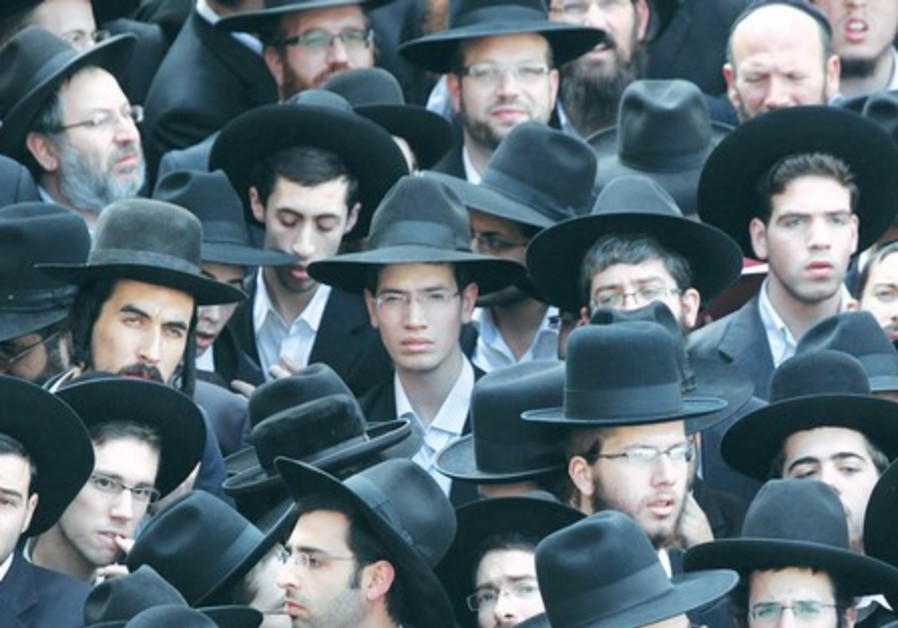Aguda, Degel feud over Jerusalem election leaves haredi alliance fragmented

Haredim lots of haredim 521. (photo credit: Marc Israel Sellem)
Moshe Lion’s victory in the Jerusalem mayoral election on Tuesday may just have saved the UTJ alliance.
The party, composed of the hassidic haredim of Agudat Yisrael and the non-hassidic “Lithuanian” haredim of Degel Hatorah, has been riven by a fierce dispute during the municipal election, which has created severe tensions between the long-term allies that threatened to tear the union apart.
The fundamental point of disagreement is the traditional 60:40 percent ratio of representation the two parties used over the last 30 years since United Torah Judaism was formed in 1992, following the establishment of Degel four years earlier.
It was thought at the time that the hassidic community outnumbered the Lithuanian community on a 60:40 ratio, so that when the two groups ran in a joint list, nationally or on a municipal level, this imbalance should be reflected in the allocation of Knesset and municipal council seats.
Degel has long claimed, however, that the Lithuanian community is at least the size of the hassidim, and these elections proved to be the limit of Degel’s patience with Aguda’s attitude.
Although during negotiations Aguda finally agreed to a 50:50 split in Jerusalem, it still insisted that this be conditioned on backing its candidate, Yossi Daitch, for mayor along with other conditions.
Degel refused, and its leadership said in essence that the two parties should run separately to determine their respective electoral strength.
Degel ended up with six seats on the municipal council to Aguda’s three, a deeply embarrassing result for the hassidim.
At the same time, Aguda and its political chairman, MK and Deputy Health Minister Ya’acov Litzman, suffered other setbacks in Haifa, Arad and most dramatically in Jerusalem on Tuesday.
Because it was still stinging from its defeats in the first round of municipal elections, Aguda could not bring itself to back the Degel candidate, Lion. Instead, it told its hassidim they need not vote for either candidate, but in the case of some hassidic groups with a nod and a wink at voting for Berkovitch in revenge.
The Gur Hassidim, the biggest hassidic community in the country and the most influential and represented by Litzman, went even further and actively encouraged its hassidim to vote for Berkovitch.
Had Berkovitch defeated Lion, with the accompanying jubilant celebrations that would have been set off among Aguda, Degel would have certainly gone it alone on a national level, said one party insider.
As it is, the Lithuanians are still peeved in the extreme by Aguda’s behavior, but the success of Lion has tempered their anger.
WHAT IS now likely for the two warring haredi factions in the near future and in any national election that might be called, which has to take place by November 2019 but, in light of Avigdor Liberman’s resignation on Wednesday, could well happen earlier? Degel’s electoral analysts reckon that the party is worth as much as 120,000 votes nationwide, enough, just barely, to pass the 3.25% electoral threshold and gain four seats.
So a lone run for Knesset without Aguda is a possibility. However, given that this risks not making it into the Knesset at all, it seems highly unlikely that Degel would take that risk.
Eli Yishai’s Yahad Party, which received very close to 120,000 votes in 2015, didn’t make it over the electoral threshold and ended up with nothing but a massive election campaign debt.
Another possibility that has been floated is an electoral alliance with Shas, whereby the two parties would run on a joint list but split up after the election into their constituent parties.
This is certainly a viable alternative to running with Aguda, especially bearing in mind that Degel and Shas united in the current municipal elections to mutually back their respective candidates in several cities, at the expense in some instances of Aguda.
The central problem here is that if Shas and Degel unite and leave Aguda out in the cold, it could lead to Aguda failing to pass the electoral threshold and being wiped out.
This would constitute a massive blow not just to Aguda itself but to haredi political power in the Knesset in general, and it seems unlikely that all sides would contemplate such a risk, despite the simmering feuds and disagreements.
Aguda could feasibly unite with Yahad or with the extremists of the Jerusalem Faction, a Degel splinter group that formed the Bnei Torah political party, but even then would have to give those parties seats in the Knesset and other concessions.
That being the case, it would appear that once Aguda has taken stock, done an accounting and perhaps reconciled itself with the new political reality and Degel’s strengthened hand, the party will realize that concessions to Degel are inevitable and necessary to protect itself and to preserve haredi political clout.
It would be dramatic indeed if the hassidic party were to reject this path and break up its 30-year alliance with its Lithuanian brothers-in-arms because of the defeats it has suffered over the last few weeks.
Join Jerusalem Post Premium Plus now for just $5 and upgrade your experience with an ads-free website and exclusive content. Click here>>






Comments are closed.